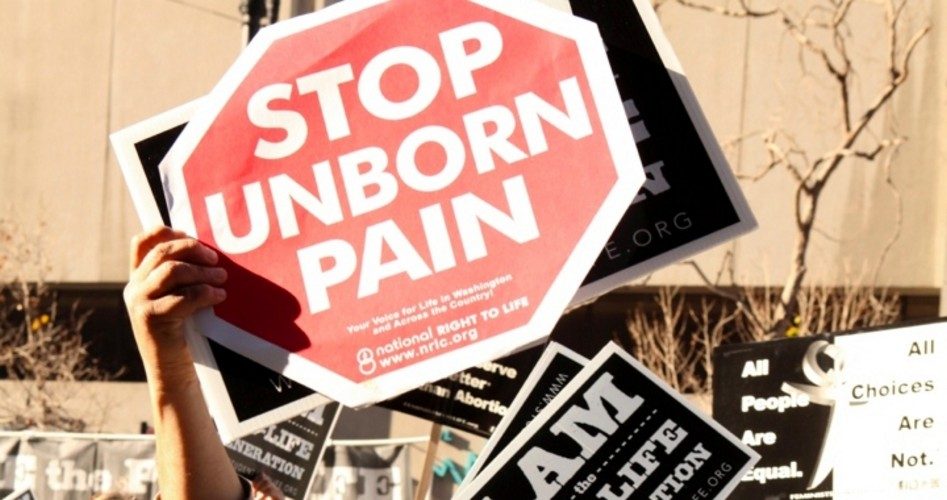
The fallout from the House Republican leadership’s decision to cancel a vote on a controversial abortion bill on Thursday continues, with conservative activists warning that Republicans who moved to scuttle the bill may face primary challenges in 2016.
“I believe in political retribution, otherwise you might as well close up shop,” Susan B. Anthony List President Marjorie Dannenfelser told The Hill. The House had scheduled a vote on a bill to ban most abortions after the 20th week of pregnancy on January 22, the date of the annual March for Life in Washington to mark the anniversary of the Supreme Court’s 1973 Roe v. Wade decision. But the vote on the Pain Capable and Unborn Child Protection Act was scuttled at the last minute due to opposition, led by Republican Representatives Renee Ellmers of North Carolina and Jackie Walorski of Indiana, over an exception for instances of rape that applies only when the rape has been reported to police. The U.S. Department of Justice has estimated 70 percent of rapes go unreported, often because victims fear retribution by their assailants. Some House members argued the bill would alienate women and younger voters in the 2016 election and beyond.
The House instead passed a bill banning federal funding for most abortions. Republican lawmakers and members of the Susan B. Anthony List who met with House Majority Leader Kevin McCarthy (R-Calif.) said McCarthy assured them the Pain Capable bill will be brought up soon. But abortion foes say abandoning the bill on the anniversary of Roe v. Wade was a betrayal of the party’s stand on the right to life.
“I think there will be some consequences for this,” said Tony Perkins of the Family Research, predicting there will likely be primary challenges for those opposed the bill. “I don’t know what is going through the minds of some of the Republican women that changed their positions on this,” Perkins told The Hill. “I know they’re hearing from constituents on this and they’re going to hear from more.”
At least one GOP presidential hopeful has also criticized the House leadership for dropping the bill.
“I hope they don’t continue to disappoint us because voters outside of D.C. are looking for a big change, not incremental changes,” said Gov. Bobby Jindal of Louisiana, one of several Republicans expected to enter the race for the White House in 2016. Appearing on Fox News Channel’s On the Record with Greta Van Susteren, Jindal said the objection to the limitation of the rape exception is irrelevant, since the bill deals with only late term abortions.
“It shouldn’t take a lot of political courage to stand up and say we are going to end late-term abortions in America,” Jindal said. “We elected a conservative Republican majority to stand up for our values. One of those important values is the dignity, the sacredness of innocent human life.”
Jindal raises an interesting point: Why would a woman who is pregnant by rape wait until the 20th week to have an abortion? In fact, without any verification, the exception for rape can easily be the exception that swallows the rule. Though pregnancies resulting from rape are extremely rare, anyone who wants to rid herself of an unwanted pregnancy can claim she was raped and thereby effectively nullify any limitation on abortion. Norma McCorvey, the “Jane Roe” plaintiff in Roe v. Wade, claimed she had been raped when she challenged the Texas law banning abortion, and later admitted it was a lie. She gave birth to the child and is now a spokesperson for the right-to-life movement.
There is another problem with the standard exceptions — for cases of rape, incest, or where the life of the mother is endangered — that are in virtually every bill to limit abortions. An effort to save the life of the woman that has the unintended effect of killing the infant in her womb is not an abortion. It is not an intentional attack on the life of the unborn child. But aborting an infant because she or he was conceived through either rape or incest is a different matter altogether. To write into law provisions permitting the destruction of life under such circumstances is to ratify the underlying principle of “abortion rights” — the belief that innocent human life is expendable and a preborn child may be killed because of how he or she was conceived, or simply for being unwanted.
The same is true concerning the issue of “late-term abortions.” That a new life begins at conception is not a religious dogma, but a biological fact. Is a human life any less worthy of legal protection in the early stages than it is in the later term of a pregnancy? Is killing a child in the womb any less of a moral crime if the infant is not “pain capable”? To campaign or pass laws against only late-term abortions is to blow a significant hole in argument for “the dignity, the sacredness of innocent human life.”
It is argued, of course, that such compromises are necessary to get at least some limitations passed by the Congress. But surely Republicans in Congress know that even the half-measures will be vetoed by President Obama and that they are far short of the two-thirds majority vote they would need to override. If the passing of pro-life legislation is a symbolic move meant to placate the party’s conservative base, why flirt with half-measures? Why not make the strongest case possible for the pro-life position? The great majority of Americans, who are neither ardently for nor against abortion, might find the argument against it more convincing if pro-life lawmakers defended the unalienable right to life fully and without compromise.
Photo: AP Images



